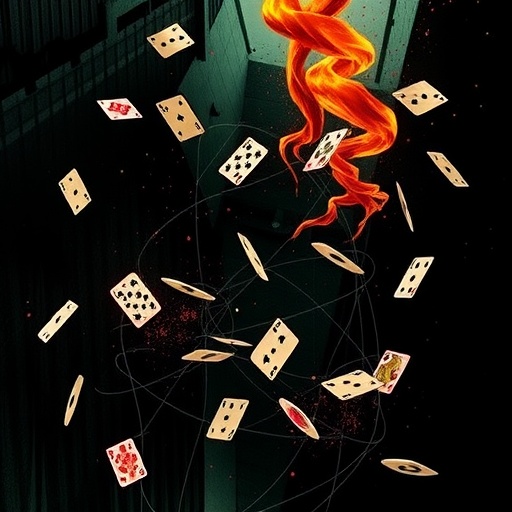In a groundbreaking study set to reshape our understanding of online gambling’s psychological impact, researchers have unveiled the intricate web connecting gambling behaviors, trauma, and overall mental well-being. This unprecedented analysis utilizes advanced network methodologies to illuminate how personal histories of trauma intertwine with digital gambling patterns, revealing potential pathways through which online betting activities might influence, or be influenced by, mental health.
As the digital gambling landscape continues to expand exponentially, its intersection with mental well-being demands urgent attention. The study, led by Helvich, Novak, Meier, and their colleagues, deployed a sophisticated network analysis framework to parse the latent connections among psychological trauma, gambling intensity, and well-being metrics within diverse populations engaged in online gambling platforms. By moving beyond traditional linear models, this approach allowed for the identification of complex, multidimensional interactions often obscured in earlier research.
This network-centric perspective unveils an ecosystem of psychological variables that underpin gambling addiction and resilience alike. The investigators employed comprehensive data sets encompassing self-reported trauma histories, gambling frequency and severity, and detailed measures of subjective well-being. The resultant model elucidates a dynamic feedback loop wherein traumatic experiences elevate susceptibility to gambling behaviors, which in turn exacerbate mental health challenges, creating a challenging cycle for affected individuals.
At the core of the findings lies the revelation that trauma functions not merely as a background variable but as an active node within the gambling-mental health network. Participants with significant trauma histories exhibited distinct profiles marked by increased gambling engagement, heightened distress, and impaired well-being. This suggests that trauma-informed approaches are essential when designing interventions aimed at mitigating the harms associated with online gambling.
Additionally, the study highlights the role of specific psychological constructs such as anxiety, depressive symptoms, and impulsivity as intermediary factors bridging trauma and gambling patterns. These constructs act as conduits through which past adverse experiences translate into maladaptive coping strategies like excessive gambling. The interplay of these variables within the network provides a nuanced understanding of the cognitive-emotional mechanisms driving gambling behavior.
One of the most compelling aspects of this research is its potential application in predictive modeling and personalized treatment. By mapping individual profiles within the network, clinicians may soon identify those at heightened risk of gambling-related harm due to underlying trauma and psychological vulnerabilities. This tailored approach promises to enhance the efficacy and precision of therapeutic interventions.
Moreover, the researchers underscore the growing importance of online platforms as both arenas of risk and potential interventions. Given the ubiquity of digital gambling, the study advocates for integrating mental health support mechanisms directly within these interfaces. Interactive tools powered by real-time analytics could detect early signs of distress and provide timely resources to users, potentially breaking harmful cycles before escalation.
The methodology’s rigor stands out, combining psychometric evaluations with advanced statistical modeling to ensure robust and replicable insights. The use of network analysis represents a significant methodological leap, moving beyond correlational studies to capture the causal architectures underlying gambling and mental health interactions. This paradigm shift could serve as a blueprint for investigating other complex psychosocial phenomena mediated by digital behaviors.
Importantly, the research accounts for demographic variables including age, gender, and socioeconomic status, allowing for a granular assessment of how gambling and trauma relationships manifest across different groups. Such inclusivity enhances the study’s generalizability and highlights disparities that call for culturally sensitive intervention strategies.
While the focus is on online gambling, the implications extend to broader domains where digital behaviors intersect with trauma and mental health. The insights gleaned from this network approach may be applicable to technologies associated with addictive use patterns or maladaptive coping globally, including social media, gaming, and other digital addictions, making the findings highly relevant for digital health specialists.
The study also prompts critical reflections on policy frameworks governing online gambling. Findings suggest a pressing need for regulatory bodies to integrate psychological risk assessments into licensing and monitoring procedures. There’s a call for enhanced transparency from gambling platforms regarding user well-being data and adoption of proactive safeguards informed by empirical evidence.
In terms of future research, the authors advocate longitudinal investigations to trace the temporal evolution of trauma-gambling networks and their responses to targeted interventions. Such studies could unravel causal pathways more definitively and assess the long-term effectiveness of trauma-sensitive therapies in mitigating online gambling harms.
The research additionally contributes to the growing discourse on trauma’s pervasive influence on behavioral addictions. By positioning trauma within an interconnected network rather than as an isolated antecedent, the study enriches conceptual models of addiction with a systemic, biopsychosocial lens. This holistic view stands to foster cross-disciplinary collaborations spanning psychology, psychiatry, data science, and digital technology development.
In a nutshell, this landmark study not only deepens scientific understanding but also lays essential groundwork for pragmatic innovations in mental health care tailored for the digital age. The integration of trauma insights with sophisticated network analyses signals a new frontier in addressing the complex challenges posed by online gambling to individual and public well-being worldwide.
The pioneering nature of this work promises to catalyze further advancements in psychological research and digital health interventions. As online gambling platforms multiply and evolve, embedding trauma-informed frameworks powered by data-driven network models could revolutionize how society confronts and manages the intertwined burdens of trauma, addiction, and mental health.
Subject of Research: The interaction between online gambling behaviors, personal trauma histories, and mental well-being analyzed via network methods.
Article Title: Gambling, trauma, and the mind: a network analysis of online gambling and personal well-being.
Article References:
Helvich, J., Novak, L., Meier, Z. et al. Gambling, trauma, and the mind: a network analysis of online gambling and personal well-being. BMC Psychol 13, 1226 (2025). https://doi.org/10.1186/s40359-025-03516-z
Image Credits: AI Generated




